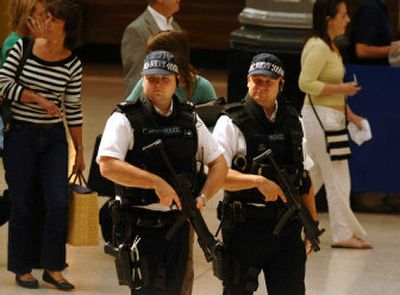Security tight as London subway line reopens

LONDON – In a show of force to calm an edgy London, officers armed with submachine guns patrolled uncrowded subway stations and police helicopters hovered over city streets as one of the busiest Underground lines reopened Thursday – four weeks to the day after suicide bombers killed 52 people.
Undercover officers mixed with a lighter-than-usual load of subway commuters – many Londoners no doubt mindful that terrorists had attempted similar attacks exactly two weeks after the deadly July 7 transit bombings.
British police investigating the botched London subway attack of July 21 said Thursday they had charged two sisters for failing to disclose information under anti-terror laws.
The city’s nerves were further rattled by a message from al-Qaida warning of more bloodshed, but people made efforts to carry on.
“People didn’t seem frightened or apprehensive; they were just reading their newspapers and getting on with things, just as the English do,” said commuter Pat Wish.
It is clear, however, that the attacks have changed the city.
London’s transport authority said subway ridership – normally 3 million passengers daily – had fallen between 5 percent and 15 percent on weekdays and 30 percent on weekends. Hotels have reported cancelations and large downtown stores say sales are down.
There are signs of fraying in London’s famously diverse social fabric, too. London police have recorded a 600 percent increase in crimes motivated by religious hatred since the suicide bombings.
“I’m a little bit anxious, I suppose,” said Robert Allen, 20, as he waited to board a subway at King’s Cross station. “I can’t help feeling wary of people who get on the train, and watching what they’re doing.”
Officials stressed there was no specific intelligence pointing to a third attack, but mounted an operation involving 6,000 officers aimed at reassuring the public. Both the July 7 bombings and the July 21 failed attacks occurred on Thursdays.
Transport authorities on Thursday reopened the Piccadilly Line, the subway line worst-hit on July 7. Service had been suspended over much of the route since a bomb exploded on a train near King’s Cross station, killing 26 commuters and the attacker.
Mayor Ken Livingstone said the reopening was “a major milestone in London’s recovery.”
Meanwhile, police charged sisters Yeshshiembet Girma, 29, and Muluemebet Girma, 21, of separate addresses in south London, with failing to disclose information under anti-terror laws.
The women, who were arrested July 27, were the second and third people to be charged in Britain in connection with the July 21 attacks. They were to appear in court today.
The first person appeared in court Thursday. Ismael Abdurahman, 23, from southeast London, faces charges of withholding information that helped suspected subway bomber Hamdi Issac avoid capture.
Issac, suspected of trying to blow up a subway train July 21, later was detained in Rome.
London police are continuing to detain 12 other suspects without charge, and Italy has three suspects. Police believe they have all the July 21 bombers in custody. There have been no arrests in the July 7 attacks, in which the four bombers are believed to have died.